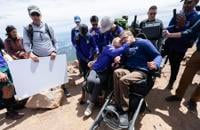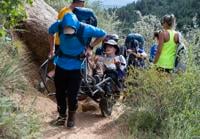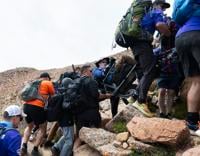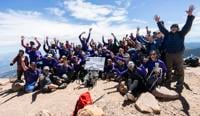As day broke last Sunday, a train of people in purple shirts rose through the treeline of Pikes Peak, onward to the tundra and most critical juncture of a two-day journey.
There were more than 50 of them, mostly strangers from Colorado Springs and beyond. They had met the day before at the head of Barr Trail, rallied by an unlikely mission.
Among them was Reed Small, a local 19-year-old with spina bifida. He had swapped his wheelchair for a rickshaw-like contraption called a TrailRider, sitting above a wheel and between handlebars for people to push from the back and pull from the front.
Chris Layne, who climbed Mount Elbert last year with the Lockwood Foundation, gives Reed Small a kiss after he and a team of volunteers from the foundation reached the summit of 14,115-foot Pikes Peak Sunday, Aug. 25, 2024.
Christian Murdock, The Gazette
People had pushed and pulled for 6-plus miles and nearly 4,000 vertical feet. They rested the night before at Barr Camp, under the night sky that Reed has come to love in his outdoorsy life.
Now came the Golden Stairs, the notoriously steep and rocky final stretch to Pikes Peak’s summit.
Jeffrey Lockwood called the group to a halt.
Volunteers pull Reed Small in the TrailRider as they begin their hike to the summit of Pikes Peak in August, 2024. About 50 volunteers with the Lockwood Foundation helped Small, who has spina bifida, climb the fourteener over two days. They spent the night at Barr Camp.
Christian Murdock, The Gazette
“We are about to enter some very technical terrain for the TrailRider,” he said. “This is gonna be a process.”
Reed’s eyes were on the summit. He tightened his grip around his handlebars. Companions tightened grips around theirs, behind him and in front of him. And on they went.
Building a team
So continued Lockwood Foundation’s latest expedition on a 14,000-foot peak in Colorado. It was the young organization’s first on Pikes Peak, a highly logistical project almost two years in the making.
Lockwood, 36, started the nonprofit in 2018. It was a bold mission sparked amid his work as a mountain guide and caretaker.
The volunteers lift Reed Small and his TrailRider over the tight turns of the 16 Golden Stairs while nearing the summit of 14, 115-foot Pikes Peak Sunday, Aug. 25, 2024. (The Gazette, Christian Murdock)
Christian Murdock, The Gazette
At the time, he’d been caring for a woman with cerebral palsy. Zara delighted in photos and videos from Lockwood’s alpine trips.
“One day we were watching a video,” Lockwood recalled, “and under her breath I could hear her say, ‘Man, I wish I could do that.’”
He resolved to piggyback her up 14,000-foot Mount Blue Sky. “Not sure if it was the best risk I ever took or the dumbest thing I’d ever done,” he said.
It was a successful summit.
“We cried, we laughed, we cried again, we laughed again,” Lockwood said. “And Zara, under her breath again, is whispering, ‘I can’t believe I did that, I can’t believe I did that.’ And I was actually crushed.”
Crushed that he could not imagine piggybacking another up a fourteener again — another unable to hike but deserving of that euphoric experience.
Then Lockwood learned about the TrailRider. Then he realized he needed a team to take turns pushing and pulling.
Six years later, teams have completed annual treks up Colorado’s highest peak, Mount Elbert. The fourteener is coordinated — U.S. Forest Service permission, a volunteer crew going ahead to set up overnight camp, another crew coming down to provide fresh strength for pushing and pulling the TrailRider, others below equipped with radios, rescue beacons and first-responder certifications — between much more casual trips at local parks and open spaces throughout the year.
More than 100 TrailRider trips have been annually scheduled. Over its six years, Lockwood Foundation reports rallying more than 1,200 volunteers.
One of them is Steve Rauch, a retired clinical social worker and lifelong climber in Colorado Springs. He joined the Elbert ascent in 2021, the year a woman with ALS took on the mountain in the TrailRider.
Reed Small, who has spina bifida, and the team of volunteers from the Lockwood Foundation cheer for a photo at the summit of 14,115-foot Pikes Peak last week 2024, after accomplishing the climb from Manitou Springs.
photos by Christian Murdock, The Gazette
“It just blew me away,” Rauch said. “There’s like 45 people going up this mountain helping this one woman.”
The TrailRider’s pushers and pullers were people from “all walks of life,” Rauch came to learn. “Whether it’s part time at McDonald’s or big-time corporate CEOs.”
They were people with immense mountaineering experience and hardly any at all.
“People from out of state, from all over Colorado, all races and religions, different political views,” said Andy Schlichting, a Lockwood Foundation board member often pulling the TrailRider.
Joline Weissgarber is another regular volunteer. She’s a special education teacher in the Springs, well aware of what the TrailRider excursions have meant for adaptive athletes.
“I keep pictures of these people who have never been on a trail before, and now they’re gliding up the trail,” Weissgarber said. “They’re touching the rocks, the ferns, the grass, and just loving these places they couldn’t normally get to be in.”
And all around them in those pictures, strangers lending a hand.
A hard world
Early that Saturday before the Pikes Peak climb, Reed’s mom, Sara Thinger, was suddenly overcome by emotion.
“I got up this morning thinking about 70 volunteers all for him,” she said. “All these people just for him.”
Her son was similarly awed. “Insane,” Reed said there at the trailhead.
“The thought of 70 people helping me is insane,” he told a lead volunteer, Phil Stafford.
“Not helping you,” Stafford replied. “It’s 70 people with you. Big difference.”
To Reed and Sara, the world hasn’t always seemed to be with them. This has been one hard lesson from spina bifida, and life in a wheelchair.
Reed sometimes combats the world with humor.
“Ah, yes,” he said. “My old enemy, the stairs.”
Always stairs.
“There’s a meme that says, ‘Oh, we should make a ramp here. And people are like, ‘No, we need stairs!’” Sara said. “It’s like, ‘No, but everyone can use a ramp!’”
Buildings without elevators. Sidewalks with unending curbs. Bathrooms with too-narrow doors.
Your weekly local update on arts, entertainment, and life in Colorado Springs! Delivered every Thursday to your inbox.
Success! Thank you for subscribing to our newsletter.
Also, homes without the right configurations and accommodations; Reed’s family built their house in Colorado Springs. Sara is a physical therapist at Children’s Hospital, someone whose education and career previously provided insight into spina bifida.
And so at 20 weeks with Reed, when she learned about the baby’s spinal cord not developing properly, she had an idea of what the future held.
“I knew the progression, and I knew most kids hit adolescence and that growth spurt, and it gets a lot harder,” she said.
Harder in ways impossible to imagine. In ways that 18 surgeries in 19 years are impossible to imagine.
He was once a child gleefully stumbling between couches in the living room. Sara can still hear that boy: “I’m walking! I’m walking!” Later he got help from a walker. Later from crutches through high school. Around 2020, Reed’s legs started failing him completely.
Sara could’ve predicted this. But there is an unpredictable toll to worrying about other kids being nice at school. To learning about your son dreaming in his sleep of running, flying, climbing up trees.
And then there are those hard reminders of exclusion — those stairs, over and over.
“I do wish the world was more accessible,” Sara said.
Making mountains for all
The world has not stopped Reed.
He’s hopped onto tandem bikes and into kayaks. He’s tried rock climbing, sit-skiing and snowmobiling. He loves camping and the national parks, loves simply being outside. Outside, “I just like thinking to myself about life stuff,” he said.
He loves the outdoors as much as his mom and stepdad. Sara and Charles have climbed all of Colorado’s fourteeners and recently checked off every high point in every state.
They married atop Pikes Peak in 2012. Ever since, they’ve wondered about some way of hiking up the mountain with Reed.
Yes, there was the train, and yes, there was the Pikes Peak Highway.
“Just because you can drive somewhere does not mean you’re getting the same experience hiking,” Sara said. “Not at all.”
This was a social media comment Lockwood read ahead of the hike with Reed: “Isn’t there a road up Pikes Peak? … aren’t there better (safer) ways for the disabled to experience the wilderness? Whiskey-Tango-Foxtrot is the matter with you people???”
Lockwood has read such comments before. In response to the concerns, he starts with this: “We do our due diligence.”
For the fourteener hikes, the person in the TrailRider needs to have shown comfort and confidence in the chair from previous, modest hikes. They need doctors’ notes, Lockwood said. Even better if there is accompanying family familiar with needs and the mountains — like Reed’s parents.
Then Lockwood needs volunteers. Dozens of people strong enough to take turns pushing and pulling the TrailRider — 40 pounds on its own — and who know their own limits, so as not to compromise the mission. He especially appreciates medical expertise and first-responder training.
These dozens of people marching over fragile alpine pose environmental impacts, and Lockwood has recognized this; the impacts might be similar from foot and bike races in the mountains, some point out. Lockwood has emphasized Leave No Trace ethics.
Some critics fire him up. “People who think you have to be some superhero to be up here,” he said, “that’s bull(expletive). All of us belong here. All of us.”
He likes to think there has been symbolism to the annual Elbert ascents, Colorado’s highest point. Just as he saw symbolism to Pikes Peak, America’s Mountain. In terms of mileage (about 12) and elevation gain (nearly 7,000 feet), Pikes Peak would be Lockwood Foundation’s greatest challenge.
“This idea that America’s Mountain is for everybody, that’s really symbolic,” Lockwood said.
‘The right mindset’
A big crowd of strangers gathered around the bottom of Barr Trail that Saturday morning.
“This is a scary mission in some ways,” Lockwood told them. “It would’ve been easier to stay home. But what I can promise you from this is a full heart and, dare I say, maybe even some glory.”
Glory indeed.
The next morning saw reinforcements: More volunteers drove to the summit and hiked down to Reed — fresh strength on the TrailRider. It would be needed on the Golden Stairs.
Pushing and pulling on trail turned into lifting over rocks and tight, exposed switchbacks.
There were simultaneous acts of trust: between the four or five people lifting Reed at any time, their muscles burning between sharp rocks; between the train of people who constantly shifted upward to stand on loose rock and serve as his barrier, a human rail against those exposed ledges.
And Reed trusting them all.
The higher they went, the more they cheered.
“You’re good, Reed! You’re good! We got ya!”
“Teamwork makes the dream work!”
“Good job, guys! Good job! Push through, push through!”
They pushed to the summit.
They arrived to onlookers cheering, clapping, crying — none more than Reed’s mom.
“It makes my heart so full,” she said through tears. “And to think we’re all strangers, right?”
A man introducing himself as a Marine spoke. “This is the most motivating thing I’ve ever seen,” he said. “People from everywhere, and they help each other out.”
They gathered around Reed.
“People do say that people with wheelchairs aren’t able to get up this mountain,” he said. “If everyone has the right mindset … they can.”
They would shuttle down the road from the summit.
There was one more obstacle up to the parking lot: stairs. Always stairs.
But now Reed and his mom thought nothing of it. Strangers-turned-friends were all around.
Source link : http://www.bing.com/news/apiclick.aspx?ref=FexRss&aid=&tid=66d47833ecdd43459f27b1c7a24b577f&url=https%3A%2F%2Fgazette.com%2Flife%2Falongside-unlikely-team-colorado-springs-teen-in-wheelchair-summits-pikes-peak%2Farticle_30471d50-63bc-11ef-81e9-0713e0176920.html&c=8696344193021062235&mkt=en-us
Author :
Publish date : 2024-09-01 01:30:00
Copyright for syndicated content belongs to the linked Source.



